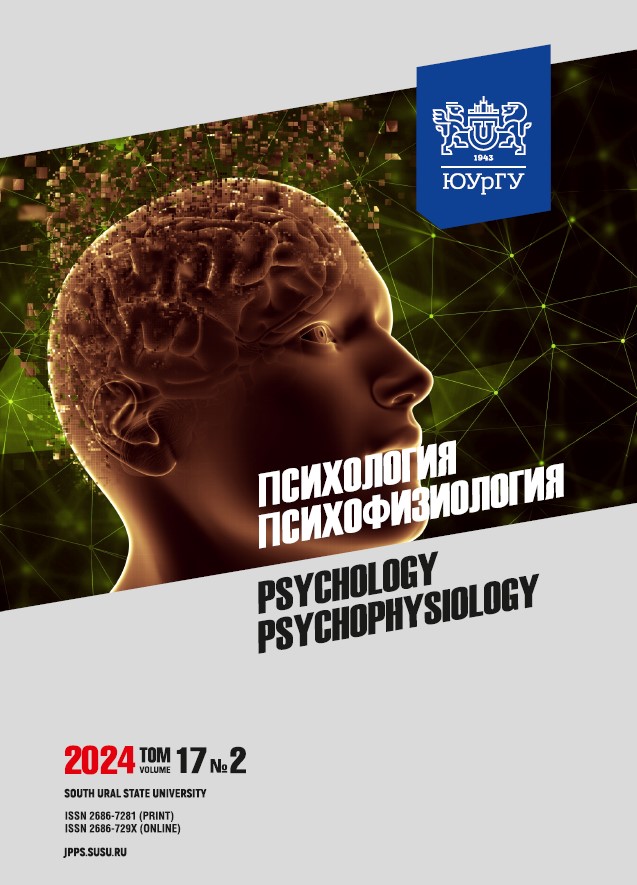The role of psychological factors in shaping attitudes towards the disease among rheumatoid arthritis patients
Abstract
Introduction. This study delves into the intersection of medical science and psychology, focusing on how patients with rheumatoid arthritis (RA) develop an internal perception of their condition. Specifically, it explores psychological predictors of adaptation to RA, given the disease’s autoimmune nature and its highly variable progression among patients. The subjective experiences of patients inevitably contribute to the clinical manifestation of RA, underscoring the importance of studying patient attitudes towards their disease. Aim: to identify the main psychological predictors of adaptation to the disease among RA patients. Materials and methods: the study involved 57 RA patients, employing a range of empirical tools including the Cloninger Temperament and Character Inventory (TCI-125), the NEO Five Factor Inventory (NEO-FFI), the TEMPS-A questionnaire, the Lifestyle Index, the Dembo-Rubinstein Self-Esteem Scale, the Color Relationship Test, and the TOBOL questionnaire. Results. The study identified psychological predictors for the development of adaptive attitudes towards the disease, such as “Persistence” and self-esteem on the “Mood” scale. Predictors for maladaptive attitudes, particularly those involving intrapsychic conflict resolution, include “Attitude to the body” and “Irritable temperament”. Predictors for destructive attitudes, particularly those involving interpsychic conflict resolution, correlate with defensive behaviors like “Regression” and “Denial”. A harmonious disease attitude, observed infrequently in this sample, correlates positively with “Agreeableness” and inversely with “Persistence” and “Novelty Seeking”. Conclusion. The results obtained offer valuable contributions to understanding the internal picture of the disease in RA patients. These results could prove beneficial for clinical psychologists in arthrology departments for both planning and conducting group and individual psychotherapeutic interventions.
Downloads
References
2. GBD 2019: Global burden of 369 diseases and injuries in 204 countries and territories, 1990–2019: a systematic analysis for the Global Burden of Disease Study 2019. / Vos T., Lim S.S., Abbafati C. et al. Lancet. 2020;396(10258):1204–1222.
3. Revmatologiya. Klinicheskie rekomendatsii [Rheumatology. Clinical recommendations]. Ed. E.L. Nasonov. Moscow. GEOTAR-Media Publ. 2020:448. (in Russ.)
4. Black R.J., Cross M., Haile L.M. et al. Global, regional, and national burden of rheumatoid arthritis, 1990–2020, and projections to 2050: a systematic analysis of the Global Burden of Disease Study 2021. The Lancet Rheumatology. 2023;5(10):E594-E610. DOI: doi.org/10.1016/S2665-9913(23)00211-4.
5. Trifonov D.A. Strategies for coping behavior in situations of somatic illness // Teoreticheskaya i eksperimentalnaya psikhologiya = Theoretical and experimental psychology. 2019;12(2):82–92. (in Russ.).
6. Reshetnikov A.V., Prisyazhnaya N.V., Pavlov S.V. et al. Rheumatoid arthritis in the Russian Federation: sociological aspects. Meditsinskii vestnik Severnogo Kavkaza = Medical news of the North Caucasus Scientific journal. 2019;14(2):374–376. (in Russ.). DOI: 10.14300/mnnc.2019.14092.
7. Martinec R., Pinjatela R., Balen D. Quality of life in patients with rheumatoid arthritis – A preliminary study. Acta Clinica Croatica. 2019;58(1):157–166. DOI: 10.20471/acc.2019.58.01.20.
8. Santos I., Duarte N., Ribeiro, O. et al. Lay Perspectives of Quality of Life in Rheumatoid Arthritis Patients: The Relevance of Autonomy and Psychological Distress. Community Mental Health Journal. 2019;55:1395–1401. DOI: 10.1007/s10597-019-00377-w.
9. Rybakova V.V., Olyunin Yu.A., Likhacheva E.V., Nasonov E.L. Indicators of rheumatoid arthritis disease activity. An association with a patients psychological status. Sovremennaya revmatologiya = Modern Rheumatology Journal. 2020;14(2):27–34. (in Russ.).
10. Lisitsyna T.A., Veltishchev D.Yu., Seravina O.F. et al. Comparative analysis of anxiety-depressive spectrum disorders in patients with rheumatic diseases. Terapevticheskii arkhiv = Therapeutic archive. 2018;90(5):30–37. (in Russ.).
11. Matcham F., Ali S, Irving K. et al. Are depression and anxiety associated with disease activity in rheumatoid arthritis? A prospective study. BMC Musculoskeletal Disorders. 2016;17(155). DOI: 10.1186/s12891-016-1011-1.
12. Boer A.C., Huizinga T.W.J., van der Helm-van Mil A.H.M. Depression and anxiety associate with less remission after 1 year in rheumatoid arthritis. Annals of the Rheumatic Diseases. 2019;78(1):e1. DOI: 10.1136/annrheumdis-2017-212867.
13. Manning-Bennett A.T., Hopkins A.M., Sorich M.J. et al. The association of depression and anxiety with treatment outcomes in patients with rheumatoid arthritis – a pooled analysis of five randomised controlled trials. Therapeutic Advances in Musculoskeletal Disease. 2022;14:e1759720X221111613.
DOI: 10.1177/1759720X221111613.
14. Chimenti M.S., Fonti G.L., Conigliaro P. et al. Evaluation of alexithymia in patients affected by rheumatoid arthritis and psoriatic arthritis: A cross-sectional study. Medicine (Baltimore). 2019;98(4):e13955. DOI: 10.1097/MD.0000000000013955.
15. Scott I.C., Machin A., Mallen C.D. et al. The extra-articular impacts of rheumatoid arthritis: moving towards holistic care. BMC Rheumatology. 2018;2(32). DOI: https://doi.org/10.1186/s41927-018-0039-2.
16. Yaltonskii V.M., Abrosimov I.N., Andrushkevich T.D., Shashurina E.M Parameters of the Subjective Pattern of Disease in Rheumatoid Patien. Rossiiskii psikhologicheskii zhurnal = Russian Psychological Journal. 2020;17(1):15–26. (in Russ.). DOI: 10.21702/rpj.2020.1.2.
17. Biryukov S.D., Vasilev O.P. Psychogenetic study of the properties of temperament and personal characteristics: analysis of the structure of the studied variables. Trudy Instituta psikhologii RAN = Proceedings of the Institute of Psychology of the Russian Academy of Sciences. 1997;2:23–51. (in Russ.).
18. Nikitenko E.A., Enikolopov S.N., Dmitriev M.N., Kovaleva E.N. Preliminary adaptation of the Russian version of the TEMPS-A questionnaire. Vestnik Sankt-Peterburgskogo universiteta. Psikhologiya = Vestnik of Saint Petersburg University. Psychology. 2019;9(2):172–186. (in Russ.).
19. Rubinshtein S.Ya. Eksperimentalnye metodiki patopsikhologii i opyt ikh primeneniya v klinike [Experimental methods of pathopsychology and experience of their use in the clinic]. Moscow. 1970:159. (in Russ.).
20. Etkind A. M. Tsvetovoi test otnoshenii [Color test of relationships] Obshchaya psikhodiagnostika [General psychodiagnostics]. Eds. A.A. Bodalev, V.V. Stolin. Moscow. 1987;221–228. (in Russ.).
21. Las E.A. Emotional and personal predictors of the attitude to illness of patients with rheumatoid arthritis. Izvestiya Rossiiskogo gosudarstvennogo pedagogicheskogo universiteta imeni A.I. Gertsena = Izvestia: Herzen University Journal of Humanities and Sciences. 2012;150:262–270. (in Russ.).
22. Cloninger C.R., Przybeck T.R., Svrakic D.M., Wetzel R.D. The temperament and character inventory (TCI): A guide to its development and use. St. Louis: Washington University Center for Psychobiology of Personality. 1994;50(12):975–90.
References on translit
-Copyright (c) 2024 Psychology. Psychophysiology

This work is licensed under a Creative Commons Attribution-NonCommercial-NoDerivatives 4.0 International License.



